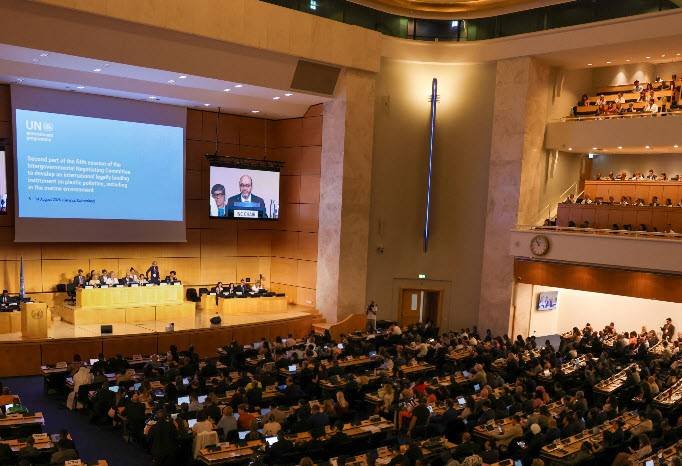The World Awaits the First-Ever Global Treaty to Tackle Plastic Pollution
Talks to create the world’s first legally binding treaty to tackle plastic pollution went into overtime on Thursday, with negotiations adjourned to the following day. Countries scrambled to bridge deep divisions over the extent of future curbs on what was meant to be the final day of negotiations at the United Nations in Geneva.
With just 30 minutes left in the scheduled meeting, the chair of the International Negotiating Committee (INC), Luis Vayas Valdivieso, informed delegates that the negotiations would run into Friday. The INC, established by the United Nations Environment Assembly (UNEA) in 2022, is tasked with developing a global treaty to address plastic pollution.
Late Thursday night, countries awaited a new text that could serve as the basis for further negotiations after delegations advocating for an ambitious plastics treaty rejected the proposed text from Wednesday. States pushing for a comprehensive treaty, including Panama, Kenya, Britain, and the European Union, expressed frustration over key articles on the full life cycle of plastic pollution being removed from the text.
Oil-producing nations opposed curbs on the production of virgin plastics, while others called for stricter controls over plastic products and hazardous chemicals. The divide between these positions poses a challenge to reaching a consensus on the treaty.
EU Commissioner Jessika Roswall emphasized the need for a comprehensive treaty that evolves with scientific advancements, stating that a “weak, static agreement serves no one.” Panama labeled Wednesday’s draft text as “repulsive” and called for a complete rewrite, while Saudi Arabia insisted on clarity regarding the treaty’s scope before any agreement could be reached.
More than 1,000 delegates convened in Geneva for the sixth round of talks, following a previous meeting in South Korea that ended without a deal. Advocacy groups protested against a “weak treaty” as delegates gathered for further discussions.
The Organization for Economic Cooperation and Development (OECD) warned that without intervention, plastic production could triple by 2060, exacerbating environmental and health hazards.
Seeking Compromise
Norwegian Minister of Climate and Environment Andreas Bjelland Eriksen, co-chair of the High Ambition Countries group, stressed the importance of compromise among all parties involved in the negotiations. He expressed willingness to discuss various articles to create a mutually acceptable agreement.
Ross Eisenberg, president of America’s Plastic Makers, expressed optimism about the potential treaty’s benefits for the industry, society, and the environment. However, concerns were raised about the U.S. potentially not ratifying a treaty containing restrictions on chemicals or plastic production.
Colombian lawmaker Juan Carlos Lozada emphasized that no deal would be preferable to a watered-down agreement. Over 300 businesses, including Unilever, have called for an ambitious treaty that harmonizes global regulations to prevent fragmentation and higher costs.
The outcome of these negotiations will have far-reaching implications for global efforts to combat plastic pollution. The world anxiously awaits the outcome of these talks as stakeholders strive to find common ground in addressing this critical environmental issue.

